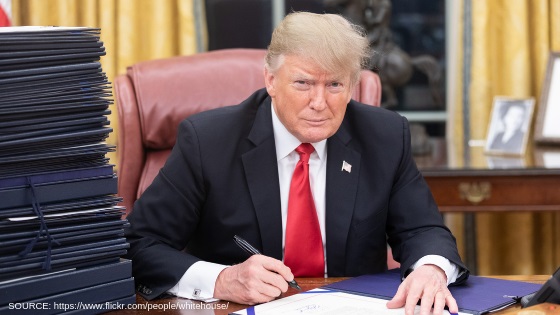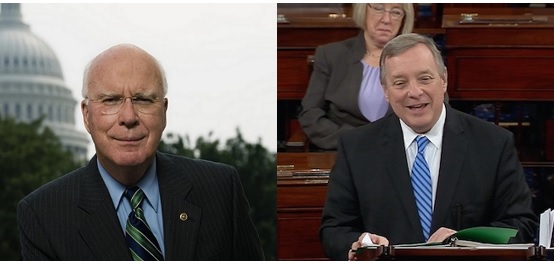
U.S. President Donald Trump signs the Asia Reassurance Initiative Act
The Philippines will receive U.S. funding assistance under the newly-signed Asia Reassurance Initiative Act (ARIA) that aims to promote Washington’s security and other interests in the Indo-Pacific region, but no funds will be given in support of the government’s anti-narcotics campaign unless certain human rights standards are satisfied.
The ARIA, signed by President Donald Trump last Dec 31, commits funds for the region amounting to $1.5 billion over the next five years. But it has one limitation specific to the Philippines, and this has to do with the Duterte government’s human rights record in connection with its anti-drug war, according to provisions of the new law.
The ARIA specifies that “none of the amounts appropriated may be made available for counternarcotics assistance for the Philippine National Police unless the Secretary of State determines and reports to the appropriate committees of Congress that the Government of the Philippines has adopted and is implementing a counternarcotics strategy that is consistent with international human rights standards, including investigating and prosecuting individuals who are credibly alleged to have ordered, committed, or covered up extrajudicial killings and other gross violations of human rights in the conduct of counternarcotics operations.”
The condition is in line with Washington’s fundamental interest in defending human rights and promoting the rule of law in the Indo-Pacific region, as stated in ARIA which notes that “several Indo-Pacific governments continue to commit human rights abuses and place restrictions on basic human rights and political and civil liberties.”
ARIA took note that “There have been unacceptable human rights developments” in the Philippines which has been identified by Freedom House as ‘Partly Free’ and where there are continued disturbing reports of extra-judicial killings.””
President Rodrigo Duterte’s brutal anti-drug campaign, characterized by extrajudicial killings of suspected drug dealers and peddlers, has strained Manila’s relations with traditional allies, the US and the European Union.
The International Criminal Court is conducting an examination into the drug-related crimes, but Duterte has brushed this aside and ordered the country’s withdrawal from the Hague-based tribunal.
Two other members of the Association of Southeast Asian Nations face a similar limitation in accessing ARIA funds. Myanmar cannot avail of the said appropriation for the International Military Education and Training and Foreign Military Financing Programs for its armed forces. Cambodia, on the other hand, cannot benefit from any assistance programs unless cleared by the Secretary of State only after certain conditions are met.
A U.S. delegation is due to visit Manila to brief local officials on the new law and reaffirm America’s commitments to the country under the ARIA.
“The meeting in the Philippines, similar to those that US had last week in China and Japan, will be a reiteration of US commitment as a security partner and to coordinate on respective Indo-Pacific strategies and security initiatives in the region, as part reassurance act signed recently,” a Philippine source told Vera Files.
U.S. Under Secretary of State for Arms Control and International Security Andrea L. Thompson was in China and Japan on January 30 to February 1 to conduct bilateral meetings with senior government officials. In Beijing, Thompson also led the US delegation in a conference there among the five UN Security Council members that discussed on proliferation, arms control, and international security.
ARIA authorizes a spending of $1.5 billion every year from 2019-2023 for a range of programs and assistance package in East and Southeast Asia that will increase U.S. security, economic interests, and values in the Indo-Pacific region.
The law aims “to develop a long-term strategic vision and a comprehensive, multifaceted, and principled United States policy for the Indo-Pacific region.”
The new law and the upcoming visit of a U.S. delegation come amidst warming ties between the Philippines and China despite the dispute over a cluster of oil-rich islands, reefs and shoals in the South China Sea. Ownership of those islands is also being contested by Malaysia, Vietnam, Brunei and Taiwan.
The Philippines won the arbitration case against Beijing but that did not deter China from further reclaiming lands and fortifying their military bases on those disputed reefs. The Duterte government has mainly played down China’s ongoing building on the contested islands.
Cited in the ARIA are the United States Congress’ findings that the core tenets of the United States-backed international system are being challenged by “China’s illegal construction and militarization of artificial features in the South China Sea and coercive economic practices.”
The funds are authorized for use “to advance United States foreign policy interests, to improve the defense capacity and resiliency of partner nations to resist coercion and deter and defend against security threats, and to conduct regular bilateral and multilateral engagements, particularly with the United States’ most highly-capable allies and partners, to meet strategic challenges, including certain destabilizing activities of the People’s Republic
of China.”
Defense Secretary Delfin Lorenzana is eager to find out Washington’s definitive stand on the South China Sea dispute as the two allies hope to begin talks to review the 1951 Mutual Defense Treaty.
“We just want to know, remove the ambiguities because they (US) always say that we do not involve ourselves in territorial disputes. I think that’s the origin of all the problems when they said we are not involving ourselves in territorial disputes in West Philippine Sea or in South China Sea,” Lorenzana said in a forum on the National Security Outlook for the Philippines in 2019 at the National Defense College of the Philippines Monday.
He will also clarify the ambiguity in the limits of the Philippine territory that the US is bound to defend in the event of an attack, if that includes Scarborough Shoal, Mischief Reef or Pag-asa island.
The MDT, which was signed in 1951 long before the Philippines claimed parts of South China Sea, states “ an armed attack on either of the Parties is deemed to include an armed attack on the metropolitan territory of either of the Parties, or on the Island territories under its jurisdiction in the Pacific Ocean, its armed forces, public vessels or aircraft in the Pacific.”
Under ARIA, the Philippines as a treaty ally and long time security partner, may tap the new US initiative for funds and assistance for counterterrorism partnership programs in Southeast Asia to combat the growing presence of ISIS and other terrorist organizations, foreign military financing and maritime domain awareness programs.
The law further emphasized the commitment of the United States to freedom of navigation under international law, peaceful resolutions of maritime and territorial disputes, and expanded security and defense cooperation with allies and partners.
(Charmaine Deogracias is currently a content strategist for Sensei, a digital solutions and influencer marketing agency in Toronto, Canada.)
